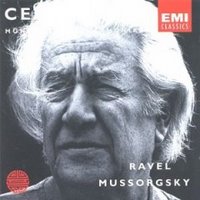 As much as I would like to respect Celibidache's wish to stay clean of recordings I cannot but be so happy that his work with Munchner Philharmoniker became available on cds. One of the most fascinating musical personalities of the last century, and one of the most controversial for that matter, Celibidache's vision on music made his concerts and make his cds a revelation for anyone who thought famous repertoire has no secrets anymore. Yes, it is true that his highly intellectual interpretations aren't the best options for the first audition of a certain musical composition. Yet, what an umbelievably rich and vast universe opens at the time one becomes quite seasoned with one work when one turns to Celibidache's version.
As much as I would like to respect Celibidache's wish to stay clean of recordings I cannot but be so happy that his work with Munchner Philharmoniker became available on cds. One of the most fascinating musical personalities of the last century, and one of the most controversial for that matter, Celibidache's vision on music made his concerts and make his cds a revelation for anyone who thought famous repertoire has no secrets anymore. Yes, it is true that his highly intellectual interpretations aren't the best options for the first audition of a certain musical composition. Yet, what an umbelievably rich and vast universe opens at the time one becomes quite seasoned with one work when one turns to Celibidache's version.One of these cases are present on this cd. Although the reason I want to talk about this cd is Ravel's Bolero, Mussorsgy's very popular work has a very similar treatment. I am pretty sure that there is no need to say anything about one of the most popular classical pieces such as the Bolero. A star that everybody thinks they know and it has no secrets for them. And then, you put in your cd player tray EMI's incarnation of Celibidache's version and everything you know falls apart. In the end can't help admitting that: "Yes, this piece is about rythm, not melody". What sense would make playing the same melody over and over again, compared with bringing the very essence of Earth's energy closer and closer to surface. The idea is to bring the vital pulsation of life closer to those fortunate to assist. This is what I imagine Celibidache is saying as he conducts his Philharmonic through this vital form of energy flow. Because this is what you feel in the end. Nature's heart beat in one fundamental form, the dance.
The orchestra he made sound like a world-class orchestra is fatefull to his master and delivers everything with precision and quite passionately. The multiple soloists do their job very well and technically speaking the whole thing is without fault. Yet, what is absolutely impressive is the parallel world of sound and feelings that opens and doesn't have any direct relationship with the actual sound production. Is where the mastery of Celibidache manages to recreate the natural phenomena that were in the beginning the very source of music.
Again, this is not the first version you want to hear but is definitely the one with which you want to be left in the end.